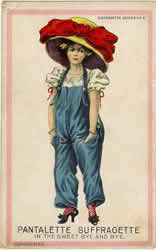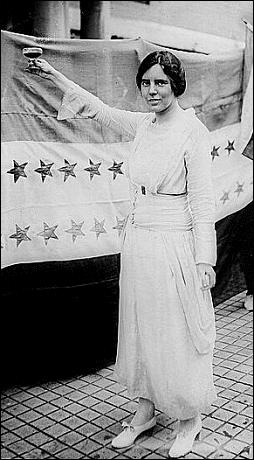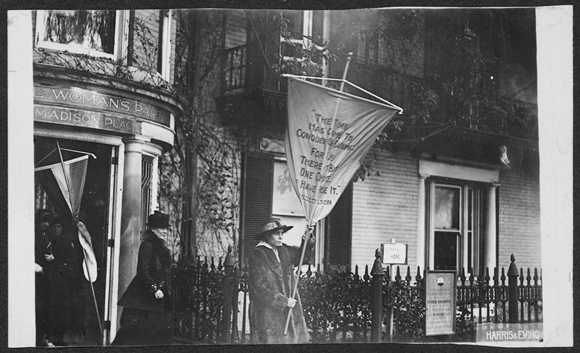Disgrace – Obama’s position on marriage equality
Richard Just (Nation – “Disgrace: Obama’s increasingly absurd gay marriage position“) draws some interesting parallels between Woodrow Wilson’s weak stand on women’s suffrage and Obama’s weak position on same-sex marriage equality:
In the fall of 1912, as his campaign for president entered its final stage, Woodrow Wilson was speaking in Brooklyn when he was asked for his opinion on women’s suffrage. The issue was very much in the political ether, but Wilson had declined to take a stand on it. According to John Milton Cooper’s excellent biography of the twenty-eighth president, he responded by insisting that it was “not a question that is dealt with by the national government at all.” The woman who had asked the question was apparently displeased by this blatant dodge. “I am speaking to you as an American, Mr. Wilson,” she retorted.
I am speaking to you as an American: It was a wonderful rebuke, one that anticipated the rhetoric of Martin Luther King and other civil rights leaders who would not rail against America but instead demand to be fully part of it. Wilson, however, was unmoved. And his slippery treatment of women’s suffrage–like his slippery approach on matters of race–did not end once he was in the White House. Running for reelection four years later, he was still playing the same exasperating game. That year, the Democrats did not endorse a constitutional amendment providing for women’s suffrage but, instead, called on the states to extend voting rights to women. Such a half-measure looks cowardly in retrospect, of course; but it also looked cowardly at the time. In November 1916, The New Republic excoriated Wilson for his weak stand on the issue. During his reelection campaign, TNR wrote, Wilson had told a group of suffragists that “[h]e was with them,” even as “he confessed to a ‘little impatience’ as to their anxiety about method.” From this, the magazine concluded that the president had “at best a vague, benign feeling about [the issue], and no conviction whatever that woman suffrage was creating a national situation which called for thorough sincerity, nerve and will.”
An evasive stance on a controversial civil rights issue from a liberal president; an insistence that the issue is primarily local, rather than national, in character; a complete failure of sincerity, nerve, and will: If these things sound familiar in 2010, it is because Barack Obama is taking exactly the same approach on gay marriage.
He goes on to discuss how Obama’s strange position – that he’s not in favor of same-sex marriage, but that constitutions shouldn’t outlaw it – sends a message not just to America about the issue but sets a tone on a world stage that is already far ahead of us.
There are also some really interesting discussion going on in the comments – dbgoroff:
As you know, Congress legislates in the area of marriage all the time. It has passed more than 1100 laws that tie benefits, at least in part, to the status of being married. It then passed DOMA, stating that for purposes of all of these federal laws,same-sex marriages will not be treated as marriages. This means that a same-sex couple married in Iowa still cannot be a “family” for purposes of the federal Family Medical Leave Act, ensure that insurance benefits for their spouse are transportable under COBRA, or partake of social security survivor benefits if their husband or wife dies, to name a few. DOMA rests on the illogical premise that the institution of marriage somehow needs to be “defended” from legal gay relationships. Obama’s current position–that he is against the right of same-sex couples to marry because of the religious association evoked by the word “marriage”–plays into that.
Also, while nominally opposing DOMA, Obama defends its constitutionality. His position is crappy constitutional law, as Perry v. Schwarzenegger and Judge Tauro’s decisions in the Massachusetts DOMA cases show. Congress, just like states, cannot legislate away the benefits of a fundamental constitutional right from a particular group. You argue that Presidents should only very sparingly not defend laws that they deem unconstitutional. First, this simply does not comport with the oath of office. Enforcing unconstitutional laws does not defend the Constitution. Second, it is not how administrations have behaved, including Obama’s, on other subjects. Third, Obama’s Department of Justice did not just say in its DOMA briefs “We have our issues with DOMA but are defending it because that is our job.” They raised every slur in the book about gay couples and compared same-sex marriages to incestuous relationships, among other treats.
links for 2010-04-03
-
J. Henry Fair photographs industrial blights from above – aerial views of some of the most dangerous industrial problems. Recent photos of coal ash depositories are beautiful and alarming
-
One or the other of these articles at Indiana's expense would be fine. Two of them, though, just makes you an asshole, Onion.
-
The non-profit organization Equal Visibility Everywhere (EVE), launched this month, is determined to solve this problem by achieving gender parity in the country’s symbols and icons. EVE will launch projects in all 50 states to increase the number of monuments, memorials and statues depicting women, as well as streets and buildings named after women. The group’s mission is to “[highlight] women’s history and achievements, eliminat[e] gender bias in our nation’s symbolism and cultural representations, and provid[e] empowering role models for girls and women.”
-
On Johnny Weir, and percieved homosexuality.
-
Wwhen you look below the surface of figure skating, a coded gendering of the sport emerges. Figure skating has both athletic and artistic components, and traditionally these have been apportioned to men and women, respectively. Men are expected to be able to land enormous jumps. Women, on the other hand, are more likely to grab one of their feet and pull it up behind their heads, sometimes while spinning fast enough to set off a nose-bleed, as Mirai Nagasu did in Vancouver. Women’s programs also emphasize a great deal of emotion when they skate, while men are expected to display their athletic strength and power.
-
Chivalry is dead because it treats women as lesser than men. Try politeness and good manners instead of "chivalry." Thanks!
-
unconstitutional.
-
The design world is changing. BIG TIME. Apple's iPad will be rewiring all of our brains.
-
Interesting quote: "As I note in How We Decide, this data directly contradicts the rational models of microeconomics. Consumers aren't always driven by careful considerations of price and expected utility. We don't look at the electric grill or box of chocolates and perform an explicit cost-benefit analysis. Instead, we outsource much of this calculation to our emotional brain, and rely on relative amounts of pleasure versus pain to tell us what to purchase." — the thing is, this is definitely not true of Stephanie. It's why we have trouble shopping together, because she is ALWAYS doing the cost/benefit analysis, and trying to negotiate with my lizard brain that says WANT!!!
-
cute boys. Cute cats. Together at last.
links for 2010-04-01
-
Miss Peyton has conducted extensive research into the origins of beer for a new book, and discovered to her surprise that a woman's touch was found on beer throughout the ages. Nearly 7,000 years ago in Mesopotamia and Sumeria, so important were their skills that they were the only ones allowed to brew the drink or run any taverns. And in almost all ancient societies beer was also then considered to be a gift from a goddess, never a male God.
-
Big burly guys like to knit, too. They also find it to be zen.
Tactics and Techniques of the National Woman’s Party Suffrage Campaign
 Something that caught my eye as I was wandering through the Library of Congress photographs of the women’s movement…
Something that caught my eye as I was wandering through the Library of Congress photographs of the women’s movement…
Tactics and Techniques of the National Woman’s Party Suffrage Campaign
Summary
Founded in 1913 as the Congressional Union for Woman Suffrage (CU), the National Woman’s Party (NWP) was instrumental in raising public awareness of the women’s suffrage campaign. Using a variety of tactics, the party successfully pressured President Woodrow Wilson, members of Congress, and state legislators to support passage of a 19th Amendment to the U.S. Constitution guaranteeing women nationwide the right to vote. In so doing, the NWP established a legacy defending the exercise of free speech, free assembly, and the right to dissent.The NWP effectively commanded the attention of politicians and the public through its aggressive agitation, relentless lobbying, clever publicity stunts, and creative examples of civil disobedience and nonviolent confrontation. Its tactics were versatile and imaginative, drawing inspiration from a variety of sources-including the British suffrage campaign, the American labor movement, and the temperance, antislavery, and early women’s rights campaigns in the United States.
Traditional lobbying and petitioning were a mainstay of NWP members, but these activities were supplemented by other more public actions-including parades, pageants, street speaking, and demonstrations. The party eventually realized that it needed to escalate its pressure and adopt even more aggressive tactics. Most important among these was picketing the White House over many months, leading to the arrest and imprisonment of many suffragists.
The willingness of NWP pickets to be arrested, their campaign for recognition as political prisoners rather than as criminals, and their acts of civil disobedience in jail shocked the nation and brought attention and support to their cause. Through constant agitation, the NWP effectively compelled President Wilson to support a federal woman suffrage amendment. Similar pressure on national and state legislators led to the ratification of the 19th Amendment in 1920.

